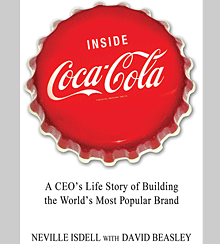要破解複雜,就先得要看到複雜、了解複雜。The Fifth Discipline 希望討論的是「不容易有答案的問題」,而非已被充分討論的「
就是討論這方面的經典之作。書中的名句是「 to lead is to alienate」,
s+b Business Literature
Leaders Resolve Contradiction
Ronald Heifetz, coauthor, with Marty Linsky and Alexander Grashow, of The Practice of Adaptive Leadership: Tools and Tactics for Changing Your Organization and the World, introduces a lesson in leadership from Inside Coca-Cola: A CEO’s Life Story of Building the World’s Most Popular Brand, by Neville Isdell with David Beasley.
Leaders Resolve Contradiction
Ronald Heifetz, coauthor, with Marty Linsky and Alexander Grashow, of The Practice of Adaptive Leadership: Tools and Tactics for Changing Your Organization and the World, introduces a lesson in leadership from Inside Coca-Cola: A CEO’s Life Story of Building the World’s Most Popular Brand, by Neville Isdell with David Beasley.
In times of transition, great leaders mobilize people and help them face the contradictions that change creates in organizational values, strategic priorities, and modes of operation. When market conditions change, these contradictions must be resolved both with innovation and by accepting the losses that accompany tough trade-offs.
During the civil rights movement in the 1960s, Martin Luther King Jr. and his colleagues created social change by revealing the internal contradictions within U.S. society — the gap between the country’s values and the way its citizens lived. As former Coca-Cola CEO Neville Isdell relates in this excerpt from his memoir, Robert W. Woodruff, who built the global company we all know today, chose to mobilize Atlanta’s white elite in celebration and support of King at a pivotal moment: January 1965, as the demonstrations in Selma, Ala., for voting rights began and two months before their culmination in President Lyndon Johnson’s “We Shall Overcome” speech, in which he announced the Voting Rights Act of 1965. Why Woodruff did it — to protect the interests of the company, for public relations gain, or for more personal reasons — we may never know. What matters most is that, for whatever reasons, he faced the central contradiction of his place and time, and perhaps after swallowing hard, mobilized his community to do the same.
— Ronald Heifetz
An excerpt from Chapter 8 of Inside Coca-Cola: A CEO’s Life Story of Building the World’s Most Popular Brand
A biracial group of Atlanta civic and religious leaders planned a celebratory dinner for Martin Luther King Jr. after he was awarded the Nobel Peace Prize in late 1964. King became only the second Nobel laureate from the Southern U.S., the first being the writer William Faulkner.
The dinner was to be held January 27, 1965, at the Dinkler Plaza Hotel in downtown Atlanta. Yet there were soon press reports that Atlanta’s business community planned to snub King, in part because after returning from the Nobel acceptance ceremony in Oslo, he had briefly joined the picket line at Scripto, a ballpoint pen manufacturing plant in Atlanta where union workers were on strike for higher wages and an end to racial discrimination in job classifications.
“Banquet for Dr. King Meets Obstacles Here,” read the Atlanta Journal headline on December 29, 1964.
Robert W. Woodruff had then retired from the day-to-day operations of Coca-Cola but still very much controlled the company behind the scenes. The banquet organizing committee, which included a Catholic archbishop, Paul Hallinan, Rabbi Jacob Rothschild, Morehouse College President Benjamin Mays, and Atlanta Constitution publisher Ralph McGill, wrote Woodruff on December 16, asking to use his name on the dinner invitations as one of the event’s hundred sponsors.
Woodruff did not immediately respond, prompting a follow-up letter on December 29, the same day the Atlanta Journal reported “obstacles” in generating support for the banquet.
In a draft letter written from his Ichauway Plantation in South Georgia, Woodruff replied that “I will be glad to be one of the one hundred Atlanta citizens serving as a sponsoring group for this recognition dinner.” Boisieuillet Jones, who ran the Emily and Ernest Woodruff Foundation, wrote a similar letter of support that same day. Both letters are now housed among Woodruff’s papers at Emory University’s Manuscript, Archives, and Rare Books Library in Atlanta.
Suddenly, Atlanta’s attitude about the dinner changed dramatically.
“All Tickets Gone for King Dinner,” read an Atlanta Constitution headline on January 21, 1965. In a complete turnaround, more than one thousand tickets were sold.
Woodruff “politely persuaded” the Atlanta business community to support the event, recalled Sam Massell, then the city’s vice mayor, who attended the banquet and was seated at the front table. “It would not have come off if it had not been for Mr. Woodruff,” Massell said.
Clearly, Woodruff realized that a no-show at the banquet would have been a worldwide embarrassment for Coca-Cola and for Atlanta.
“It was of mutual interest to have the dinner,” said Massell, who later was elected mayor of Atlanta.
The night of the dinner, King delivered to a standing-room-only, integrated audience what would become one of his most famous quotes: “If the people of good will of the white South fail to act now, history will have to record that the greatest tragedy of this period of social transition was not the vitriolic words and the violent actions of the bad people but the appalling silence of and indifference of the good people.”
All segments of Atlanta society were there: churches and synagogues, government, private universities and business, all working together, as Massell recalled, for their “mutual interest.” That is Connected Capitalism.
Woodruff and Coca-Cola quietly asserted moral leadership, knowing that it was not simply the right thing to do but that it would also benefit the company. Woodruff was a visionary who had expanded Coca-Cola worldwide and realized that its success transcended quarterly profit statements. Long-term success for Coca-Cola demanded that it take a strong moral leadership role in its hometown, extending outward from that base.
— Neville Isdell with David Beasley
Copyright © 2011 by the author and reprinted by permission of St. Martin’s Press, LLC.

沒有留言:
張貼留言